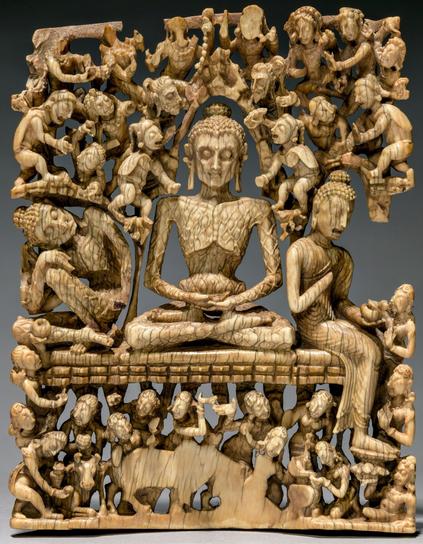People on cohost were discussing mindfulness and how mindful apps and corporations have ruined the term.
Which got me thinking on why that is so and how it came to be.
I ended up writing the following:
Mindfulness has been a crucial aspect of a lot of religions and spiritualities. It's part of the core of Buddhism and its neighboring religions. This stripping of the core elements of mindfulness was deliberately done, starting with Jon Kabat-Zinn who was a Buddhist teacher. Kabat-Zinn recognized the only way to get this practice into medicine was to strip away its spiritual components and focus only on the bare bones: "paying attention in a particular way; on purpose, in the present moment, and nonjudgmentally." Other people then created retreats and/or courses to teach this stripped down version more widely.
This art of paying attention in this particular way can be very beneficial, and studies do show that this style of mindfulness, when taught well, can aid people with their healing.
The problem is when when corporations wield mindfulness *not* as a way to help people, but as a way to *control* people.
And therein lies the difference. Corporations appropriating mindfulness, making all these "mindful apps," stripped the essential core of mindfulness and remade it as a form of control and to make it marketable.
This is why when corporations push employees to "meditate" or do other mindful activities, it can backfire instead of help. In corporate settings, its a form of control, which is the exact opposite of Right Mindfulness.
(Note: the term 'right' is from sanskrit and pali words that denote 'wise,' 'wholesome,' 'skillful,' and is not an implication of this is the only right way to do it. The Eightfold path and how to apply it's teachings is more of a guide on the path toward enlightenment, as how each person adapts, learns, and practices the path is often unique to their needs and experiences.)
Right Mindfulness requires giving up control. The four frames of reference for Right Mindfulness (as stated by Buddha):
1. Mindfulness of body (kayasati).
2. Mindfulness of feelings or sensations (vedanasati).
3. Mindfulness of mind or mental processes (cittasati).
4. Mindfulness of mental objects or qualities (dhammasati).
The practice of mindfulness cannot be separated from these frames of reference nor from its connection to the rest of the Eightfold path without it losing some of its most crucial and liberating aspects. Thus, when we are taught a stripped down version, we're often not receiving the full possible benefits because of the loss of these core elements.
So what the health industry and corporations peddle isn't necessarily mindfulness. It's an altered form focused on paying specific attention often in an effort to control one's reactions, thoughts, and feelings. (DBT does teach more of the 'letting go' aspects than any other form of this 'paying attention' meditative exercises, but there is still that essence of 'controlling' one's state that still crept into its application. Part of that is Western Psychology can't be separated from its origin of control.)
Right mindfulness requires us to let go, to be aware of our body and its processes, our feelings or sensations, or mind and thoughts, or mental objects or qualities -- to look at each and let them pass through oneself. The activities inherent in the practice of Right Mindfulness:
Mindfulness reminds us of what we are supposed to be doing. Our thoughts can often mask over reality or decenter us away from the actions we are actually performing. For example, daydreaming while doing chores. Mindfulness brings the mind back to the process of doing chores, to be fully present and aware in that moment of each aspect of the task. This full awareness aids us in completing the task well.
In mindfulness, we see things as they really are. Thoughts can often distort what we see, feel, hear, experience. So mindfulness strips away those distortions. This aspect of it is what corporations don't want us to learn, because then we were see them for what they really are: seeking control to use us in their profit making machine.
Mindfulness sees the true nature of phenomena. This essential aspect of the activity of mindfulness brings us to the root of the true nature of existence: imperfect, temporary, egoless. This awareness of the true nature of phenomena also followed from the prior activity, and it allows us to look past the distortions corporations peddle to us and to see their true nature - their power-hungry, profit-driven, and ego based exploitation of human, animal, and nature. To see this true nature can often lead people toward liberation from the corporation's hold on us.
For liberation and enlightenment to be realized, we must see the true nature of the situation we are in currently.
Often times the meditation taught by apps like Headspace isn't Right Mindfulness, but more of an exercise in awareness and interoception (awareness of one's body). These are still crucial skills to learn, and definitely can help us heal and better manage our health. However, the other aspects of mindfulness is often neglected, partly because it requires far more discipline and practice than what corporations allow their employees.
Right Mindfulness, when practiced in the correct frames of reference, will lead people into the other seven aspects of the eightfold path because Right Mindfulness, when practiced with respect to its original intent, is entangled in the other aspects of the Eightfold path.
As Thich Nhat Han wrote in The Heart of Buddha's Teaching: "When Right Mindfulness is present, the Four Noble Truths and the other seven elements of the Eightfold Path are also present."
One cannot practice one without the others also being present to some extent. That is something Corporations don't want to happen.
Why? Because the Eightfold path leads people to a higher awareness and understanding of themselves, their place in the world, and the world in general. That push toward enlightenment breaks the corporation's hold on our minds and makes us less easily controlled workers. Our enlightenment leads us toward liberation.
So mindfulness is stripped down and appropriated, so it can be a tool to keep workers calm, productive, and less likely to rise up.
Except, we don't have to keep it that way. We can take mindfulness back from the corporate toolbox. We can restore it to its roots, but that requires us to understand its roots, understand how we got to where we are now, and act upon that knowledge to realize our collective liberation.
#Buddhism #EightfoldPath #Mindfulness #Liberation #AntiCapitalist #Appropriation


